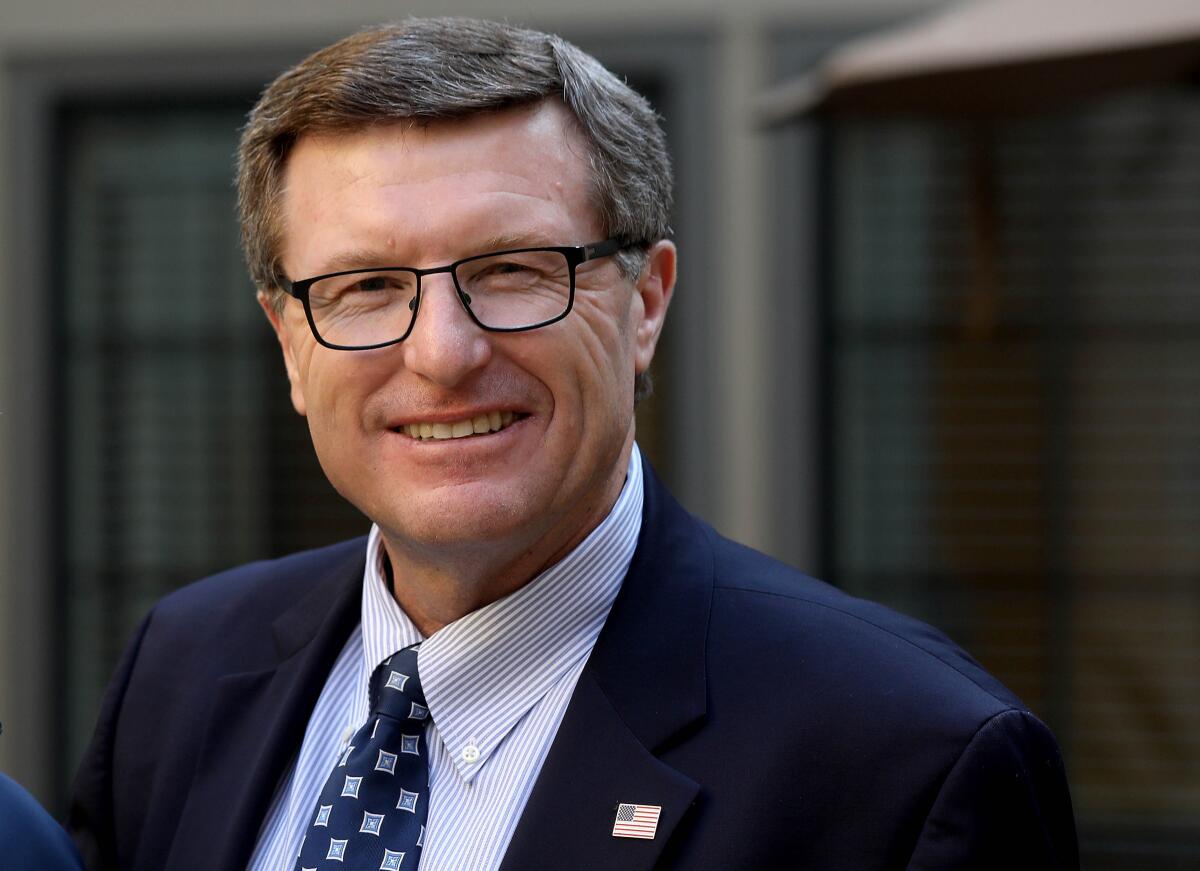‘All he saw to me was my skin color’: Clerk faces backlash from judge’s comment

After two weeks of national protests over the killing of George Floyd by a Minneapolis police officer, the top federal judge in Southern California sat for a webinar to discuss the reopening of courthouses.
Kiry K. Gray, the top clerk and executive for the courts, missed the webinar, but afterward, several people told her that her name had come up.
They told her Chief Judge Cormac J. Carney had praised her as “street-smart,” a term some viewed as racially insensitive.
Gray, the first Black woman to serve in her post, was not offended but accepted an apology from Carney and hoped to move on. Yet as criticism mounted over the comment by others, the judge called her to vent.
“I did not have to even mention your name during the webinar,” Gray recalled Carney saying in the phone call, “and it was not like I was the police officer standing on your neck.”
Gray said she was stunned and appalled. “I’m very sad that you feel this way,” she later wrote to the judge in an email memorializing the call. The two have not spoken since.
It was this pair of comments by the onetime UCLA wide receiver that set off a chain of events that roiled the courts, even reaching the 9th Circuit Court of Appeals. Many hoped the firestorm would stay within the walls of the “court family,” where judges with lifetime appointments hold sway and expect deference.
But by the end of June, Carney announced that he was stepping down from the chief judgeship in an email to several hundred court staff and fellow judges. In his email June 26, he said he considered “street-smart” to be a compliment and chalked up the private comment to her as born out of “anger and frustration.”
“It was directed at my critics, not Ms. Gray, and I said it with no ill will or disrespect toward people of color,” Carney wrote in his resignation email. “My statement was an insensitive and graphic overreaction to the criticism that was leveled against me.”
Carney declined further comment, as well as an interview request about the circumstances of his departure.
Gray at first was reluctant to publicly express her account. But amid a national reckoning over racial justice, she said she felt a need to tell her story and correct the record. She said she was shocked that when news of Carney’s resignation went public, some people attacked her for overreacting to the “street-smart” comment while dismissing the judge’s remark that followed.
“Every time I think about it, it gets me upset,” she said in an interview. “People will understand my story now.”
*****
The turmoil began June 9, during a lunchtime webinar with Carney that was organized by the L.A. chapter of the Federal Bar Assn.
It was nine days into Carney’s role as chief judge, a four-year term. Appointed by George W. Bush in 2003 after years on the Orange County Superior Court bench, Carney had long been assigned to the federal courthouse in Santa Ana. He relocated about two years ago to downtown L.A., to prepare for the chief’s post.
“Fortunately for me, we have just a fabulous clerk of the court in Kiry Gray. She’s so street-smart and really knows her job,” Carney said during the webinar.
Gray never heard the remark, nor has she listened to a recording of the webinar. She said she soon received notes and calls from attorneys and colleagues. Carney, in his resignation note and emails to Gray, acknowledged that lawyers, judges and court staff expressed their displeasure.
After a state prosecutor reached out to Carney with her critique of “street-smart,” the judge asked Gray if he should respond.
“I advised him to let it go,” Gray said, seeing criticism as a side effect of his new role. “I informed him that being a chief judge is not an easy job.”
On June 10, the day after the webinar, Carney nevertheless replied to the prosecutor and copied Gray. In his reply, the judge said that Gray “knows my heart, that the term in no way offended her, and she was touched that I thought so highly of her.”
“Quite frankly, I view [Gray] as my sister, even though she is of color and I am a white man,” Carney wrote to the prosecutor. He added that his email could be shared widely.
Carney continued to be bothered by the criticism, according to Gray. In a second call with her, Carney made the remark that she found so cutting: that he did not even have to mention her, and that it was not “like I was the police officer standing on your neck.”
Gray said the comment was a double punch. It made her mind race toward an image of her adult son lying in the street, crying out.
She would replay the comment in her mind and wrestle with the implications: she should be grateful he called her name? A foot on my neck?
She believed that if she were a white clerk of courts, none of this would have come into play.
“All he saw to me was my skin color,” Gray said.
*****
When Gray was appointed to the clerk of court position in 2015 after a unanimous vote by a panel of judges, Courthouse News noted her “incredible rise.”
To this day, judges single her out with praise.
“We have the finest district executive and clerk of court,” said U.S. District Judge Terry J. Hatter Jr., who was appointed by President Carter.
Born in Flint, Mich., Gray was raised in L.A. by parents who worked for the U.S. Postal Service. She lacks a college degree but often says she received her education through the court.
In 1985, Gray started as a temporary worker for the federal courts, coding jury questionnaires at night. She rose through the ranks, serving in nearly every department and earning a reputation for a strong work ethic.
Along the way, Gray raised a son and daughter, instructing them on the realities of being Black in America.
A longtime resident of the Inland Empire, Gray was clear to her son: no tattoos, no baggy pants, no earrings. She mandated a clean-cut hairstyle.
“We taught him these things to keep him safe,” said Gray of her son, a firefighter who has served in the military.
Carney was the third chief judge she had worked with, and in her years on the high-profile job, she knew well what was a central duty: daily, and sometimes hourly, contact with the chief judge.
The Central District of California is the nation’s largest and busiest federal court district, serving nearly 20 million people in seven counties.
“You are constantly putting out fires,” Gray said.
She likened the relationship of chief judge and clerk of courts to a marriage: constantly problem-solving and talking daily. One or two times, the dynamic could grow tense, she said, but neither side ever crossed the line.
Carney had been chief judge for less than two weeks when the webinar occurred. Their professional relationship, she believed, was in a good place.
She shared with him that they would not always see eye-to-eye. “But proper communication is the key to healthy relationships,” she said.
*****
Gray said she was agonized by the judge’s comment alluding to the death of Floyd. She had difficulty sleeping, and when she recounted what he had said on the call, she’d start crying.
Still, she continued working. In a June 15 email thread on temporary fencing outside the courthouse, Carney asked her, “Are you OK? You sounded a little distant on the phone.”
Gray replied by confronting him, repeating the quote that specified a police officer kneeling on her neck.
Carney replied in an email that he felt “misinterpreted” and said his use of “street-smart” was intended as a point of praise. He noted that he used it to describe his wife, his best friend and his son.
“The negative comments are upsetting to me because I only intended to recognize and compliment you publicly, which I did not have to do. But I wanted people to know that you were special,” Carney said.
“In fact, you were trying to comfort me and calm me down,” he added in a second email.
He lamented how some people now view him as racially insensitive and described his longstanding friendships and ties with men of color.
“I can get past the criticism of others, but I cannot continue as chief if you think this has irreparably damaged our relationship,” Carney wrote.
“The court can afford to lose me as chief,” he said. “It cannot afford to lose you.”
Over the following 11 days, a maelstrom gathered over the state of their professional bond, according to sources familiar with the matter. The two did not speak directly.
Sidney R. Thomas, chief justice for the U.S. Court of Appeals for the 9th Circuit, served as a quasi-mediator, several people said. Gray was not the person who complained to or notified the 9th Circuit, she said.
On the last Friday in June, Carney sent an email to hundreds of fellow judges and court staff, announcing that he was relinquishing his post. He remains a federal judge.
“I have apologized to Ms. Gray, but I have concluded that a simple apology will not put this matter to rest,” Carney wrote. “There will be division in the court, unnecessary, negative and hurtful publicity, and a diversion from the court’s essential mission of administering justice if I were to continue serving as the chief district judge.”
The news caught Gray by surprise, as did his resignation letter. She felt the letter did not give the full context of what had happened and disputed his contention in the letter that she had told him that others wanted him to step down.
Still, she hoped to move on. When The Times asked her for a comment about the judge’s abrupt departure, she declined.
It was a decision she soon regretted, feeling few knew her private anguish.
“‘No comment’ meant that his version of the truth is true,” Gray said.
She soon received messages of vitriol laced with doubt, and she felt like the public zeroed in on the “street-smart” moniker but dismissed everything else.
“SHAME on YOU,” said a stranger who messaged her on Facebook. “‘Street-smart’ is not a term used for blacks…. It is a compliment. U turned it into something it isn’t.”
Letters to the editor printed by The Times echoed with disbelief. And Earl Ofari Hutchinson, the president of the Los Angeles Urban Policy Roundtable, called for Carney to reconsider stepping down, saying it was “absurd” to label “street-smart” as offensive.
Hutchinson told The Times he stood by his call, noting that the “street-smart” comment ignited the controversy. But he acknowledged that perhaps the aftermath left no other choice but for the judge to leave his post.
“It’s always going to be there. That doesn’t make for a happy and smooth and efficient working relationship,” Hutchinson said.
Gray has already met with the newly named chief district judge, Philip S. Gutierrez.
“We have a new chief judge now, and I think he’s going to be terrific, and we will move on,” said Hatter, a veteran federal court judge.
“I’m a big Laker fan, and they believe in the next Laker up,” he added. “Our district believes in the next chief up.”
More to Read
Sign up for Essential California
The most important California stories and recommendations in your inbox every morning.
You may occasionally receive promotional content from the Los Angeles Times.











